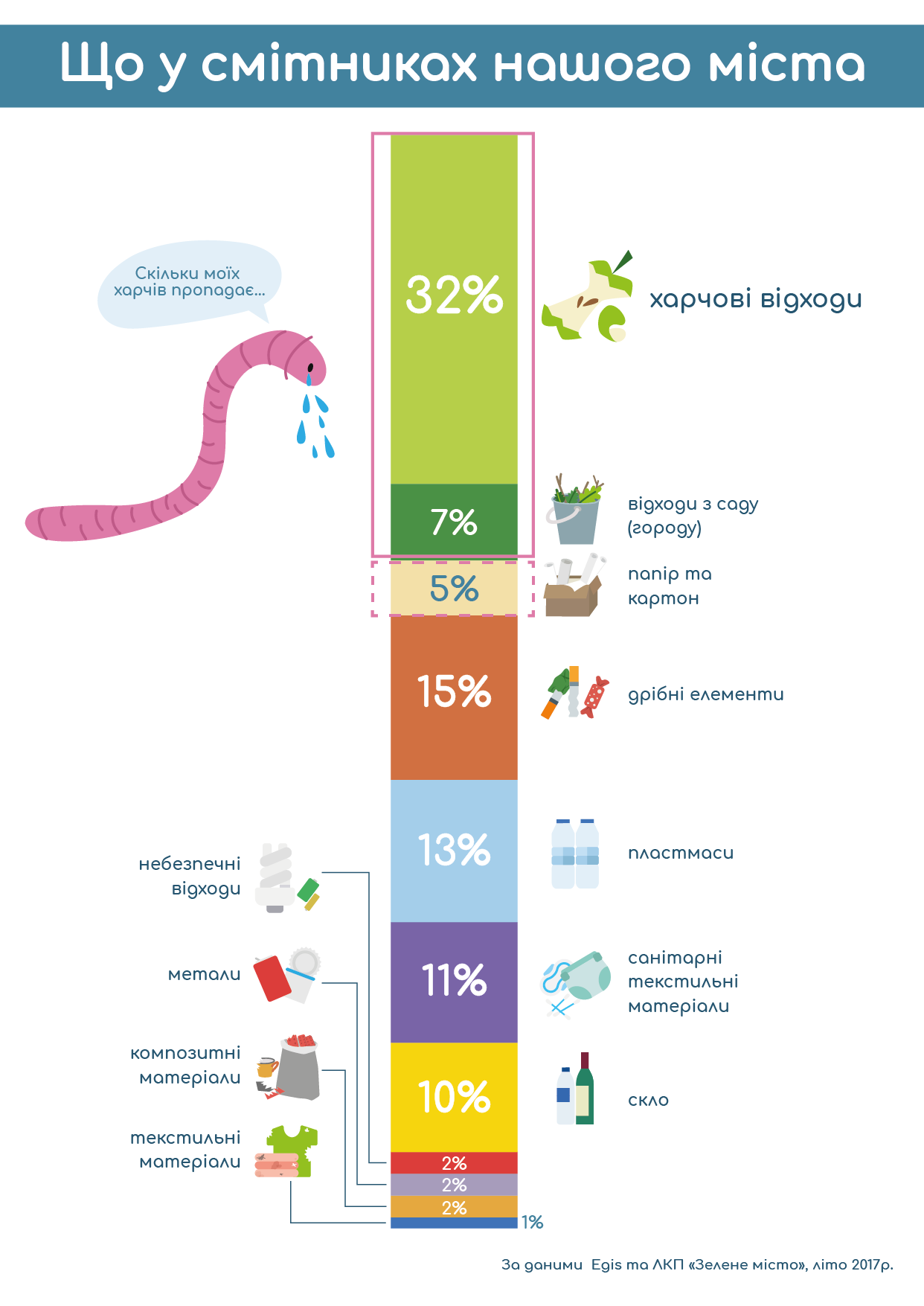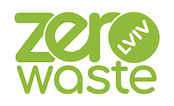ABOUT ORGANIC WASTE
Waste is a natural result of a modern person`s life. First and foremost, it is important for us to understand what kind of waste we produce – this will help us to rethink our consumer habits and find waste-free counterparts to the necessary things or products in recyclable packaging.
According to a study conducted by the French consulting company “Egis” and the Lviv municipal company “Green City” in summer 2017, almost 40% of our trash bin consists of organic waste, actually – food waste. The following parts are plastics and small elements, which are often disposable plastics.

The importance of waste separation in general
The first thing we should try to do is to reduce the amount of waste that is in our landfill. And this, in fact, is not difficult at all. Only limiting the use of disposable plastic and replacing it with reusable alternatives will significantly change the situation in our garbage bins.
Even if you minimize unnecessary items and do not use disposable plastics, there are still materials and items that you can’t replace. It is usually glass, metal, paper and solid plastics (for example, jars of household chemicals and cosmetics). It is important to sort this waste so that it does not end up in the landfill. Resources like glass and metal can be recycled many times and – sorted – they will not go to цфіеу but will be transformed into new products.
Waste sorting can be organized in different ways:
- to do it in a pantry in the house and arrange boxes or containers there, ordering removal or self-transporting recyclables to special collection points or recycling stations;
- arrange waste sorting into separate containers with your carrier company.
It is also impossible to get rid of food waste. That is why it is important to compost it so that it does not create unnecessary problems in the landfill, and returns as a fertilizer to nature, which will provide us with the new food.
How to reduce the amount of food waste?
No, we will not offer you to eat less. There are many ways to reduce food waste in everyday life that are of great importance in terms of environmental impacts, but often we do not think about them. Here are some tips that do not require a lot of sacrifices, but with their help, you can create less organic waste, more consciously consume products and even save the situation with overflowing landfills:
Plan your purchases and make lists.
Reckless shopping often leads to excess products in the fridge. And the excess products are usually spoiled and thrown away. To avoid this, we recommend you to make a menu for a week or at least write a list of dishes you want to cook. You should start by taking stock inventory. So you will not buy what is already at home and take into consideration the products in the refrigerator when compiling the menu. During this planning, you can write down the products that are missing for the selected dish and make the final shopping list. You can write it on a piece of paper, but we recommend doing it on your phone (because you won’t forget it when you go to the store). You can simply create a shopping list in notes or use special applications.
Use cloth bags, shopping bags, and baskets instead of plastic bags.
A plastic bag is a one-time lightweight hazardous item that goes to the trash and clogs up the environment very quickly. We recommend scheduling weekly purchases and bringing with you everything you need for shopping: bags, jars, containers, and packing it all into a large shopper or basket. Reusable cloth bags can also be thrown into a shopper or backpack and always be with you in case of an unplanned grocery store visit.
Buy at the farmers market and support local manufacturers.
Local markets and producers have not only the best quality products, but it is not the only benefit you will get. Supporting your region’s small businesses is an even greater step towards sustainable living. Products from your area do not require long-distance transportation (which affects both the condition of the products and the air pollution levels), it is easier to avoid excess packaging and unnecessary receipts.
In order for products to stay fresh longer, they must be properly stored. Do not pack products in plastic bags to refrigerate. Doing so you only shorten their life, creating conditions for condensation and decay (especially for the greens). It is also worth exploring how to properly place food in different parts of the refrigerator, and what is best to keep outside the refrigerator.Store products and excess food properly.
Master your skills of waste-free cooking
No, you don’t need to eat watermelon with its peel, but you can make really tasty candies out of it. When disassembling a pumpkin, be sure to extract and dry the seeds, they are a source of useful vegetable fats. Also, potatoes can be well washed and baked with the peel. And we just saved half a bucket of waste. There are many more such examples. Just google it.
Composting.
It is important to properly dispose of the generated food waste separately from the mixed waste since getting food waste to landfills causes a lot of damage. Composting is the best way. Read all about composting in the next section.


 UA
UA